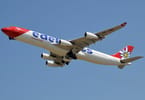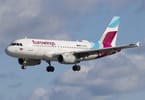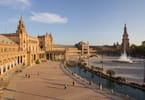As the FIFA World Cup draws nearer and the host football association, local transportation, and hotels and resorts are gearing up towards the biggest challenge of their lives, the country’s air traffic controllers, airports, and ground-handling companies are also practicing dry runs ahead of what might be the busiest period for air traffic ever seen in the South African skies.
The country’s main international hubs, Johannesburg’s Oliver Tambo along with Cape Town and Durban, are expected to see unprecedented numbers of flights coming in and leaving during the world cup, as the teams and the masses of their fans move from venue to venue, but then so will all the airports of the venue cities across the country.
Even in comparison, according to a well-informed aviation source in Pretoria, the All Africa Games or the Cricket World Cup, which were hosted over the past decade and a half in South Africa, have not come near, even if combined, to the expected influx of visitors over such a short period of time, and all hands will be needed on deck, so to speak, when the time comes in June.
It is also understood that parking areas on airports presently reserved for military purposes may be opened for the duration of the tournament to provide added parking space for aircraft, while a last-minute race is also on to complete expansions of apron, taxiway, and runway facilities.
A source from South African Airways, the host and home carrier for the games – although Emirates is the main airline sponsor for FIFA – has also confirmed that the airline will be operating an enhanced and expanded 24/7 schedule to make most use of planes ordinarily parked overnight to move the anticipated large number of footballing and tourist visitors across the vast country.
Other privately-owned airlines registered in South Africa have also made final preparations to increase their own capacities through short-term “wet leases” aimed at boosting the available seat numbers, although SAA was not to be drawn into this issue if they would seek assistance from their alliance partners to enter into short-term leases also. There are some indications, however, from such airlines as Lufthansa that their planes, normally arriving in the morning and returning to Europe in the evening, may operate some flights for SAA instead of just standing there idle, making money for both in the process.
Meanwhile, sources in the UAE have given the clearest indication yet that Emirates will be using their A 380s to fly their regular daily flights into South Africa to also offer more seats, which in any case will be at an absolute premium in the run up to, during, and immediately after the event, when progressively the eliminated teams and their supporters begin their journey home, while the knock-out stage goes underway and the losers make an early exit from South Africa.
In a related development, several countries in Eastern Africa and the Indian Ocean have also geared up their promotion towards “twin center” holidays, trying to attract tourists going to the World Cup to stop over at their own shores either before or after the tournament.
USHBU MAQOLADAN NIMA OLISH KERAK:
- Meanwhile, sources in the UAE have given the clearest indication yet that Emirates will be using their A 380s to fly their regular daily flights into South Africa to also offer more seats, which in any case will be at an absolute premium in the run up to, during, and immediately after the event, when progressively the eliminated teams and their supporters begin their journey home, while the knock-out stage goes underway and the losers make an early exit from South Africa.
- Even in comparison, according to a well-informed aviation source in Pretoria, the All Africa Games or the Cricket World Cup, which were hosted over the past decade and a half in South Africa, have not come near, even if combined, to the expected influx of visitors over such a short period of time, and all hands will be needed on deck, so to speak, when the time comes in June.
- The country's main international hubs, Johannesburg's Oliver Tambo along with Cape Town and Durban, are expected to see unprecedented numbers of flights coming in and leaving during the world cup, as the teams and the masses of their fans move from venue to venue, but then so will all the airports of the venue cities across the country.





















